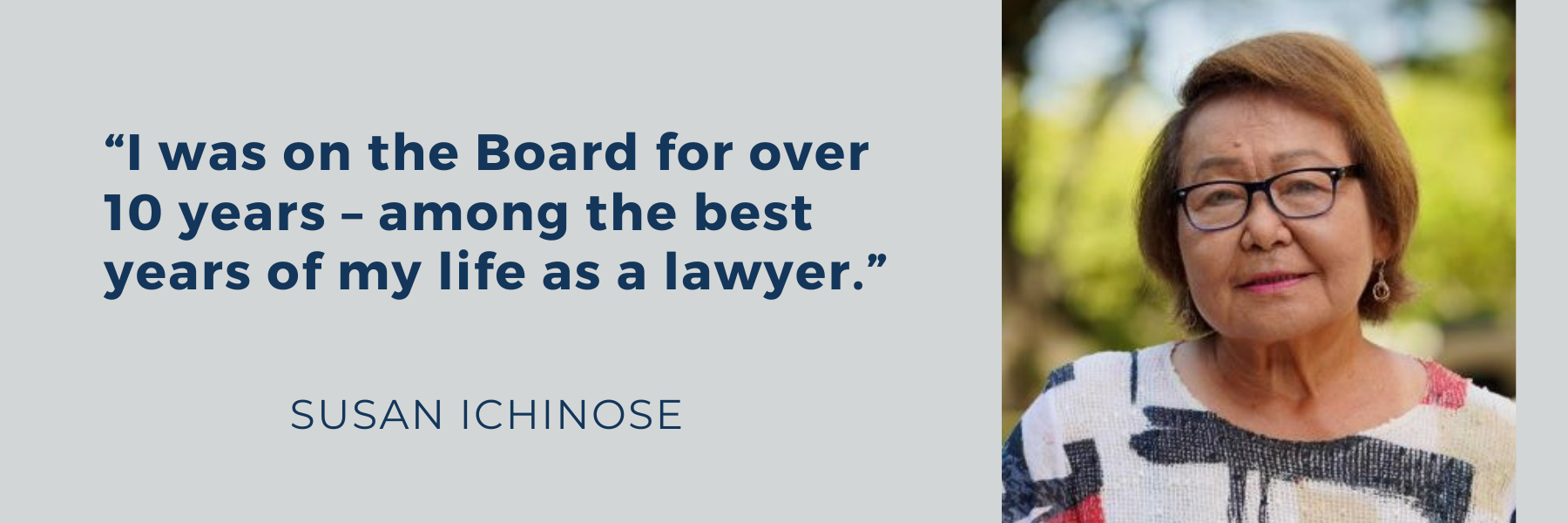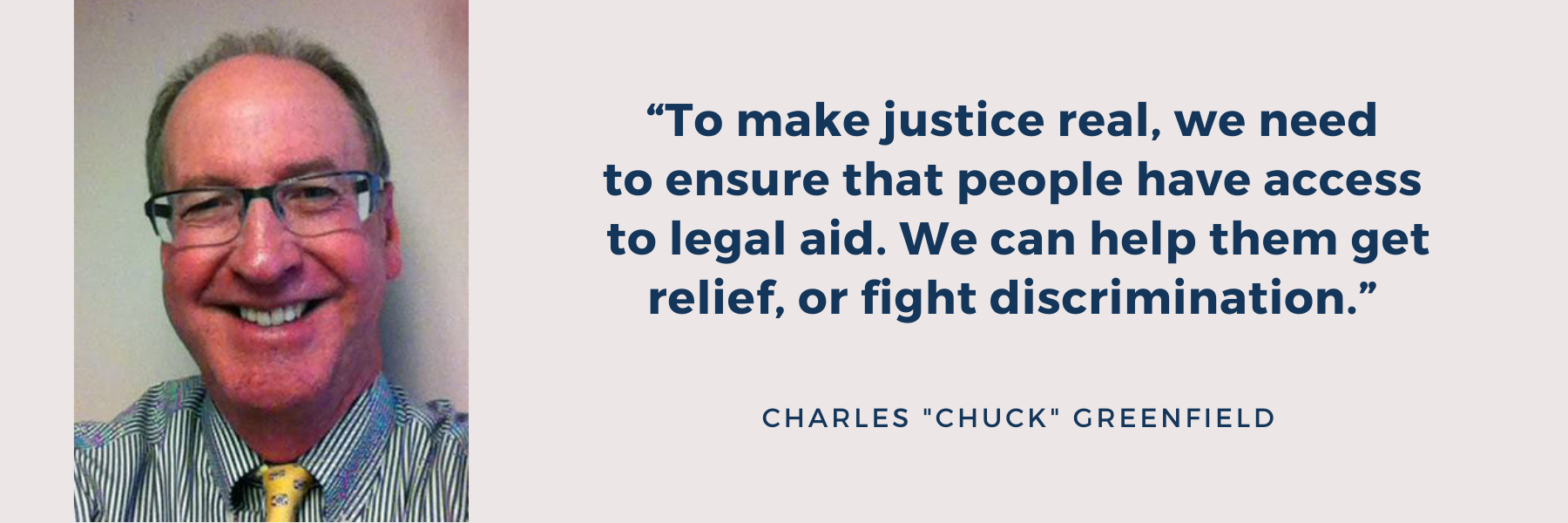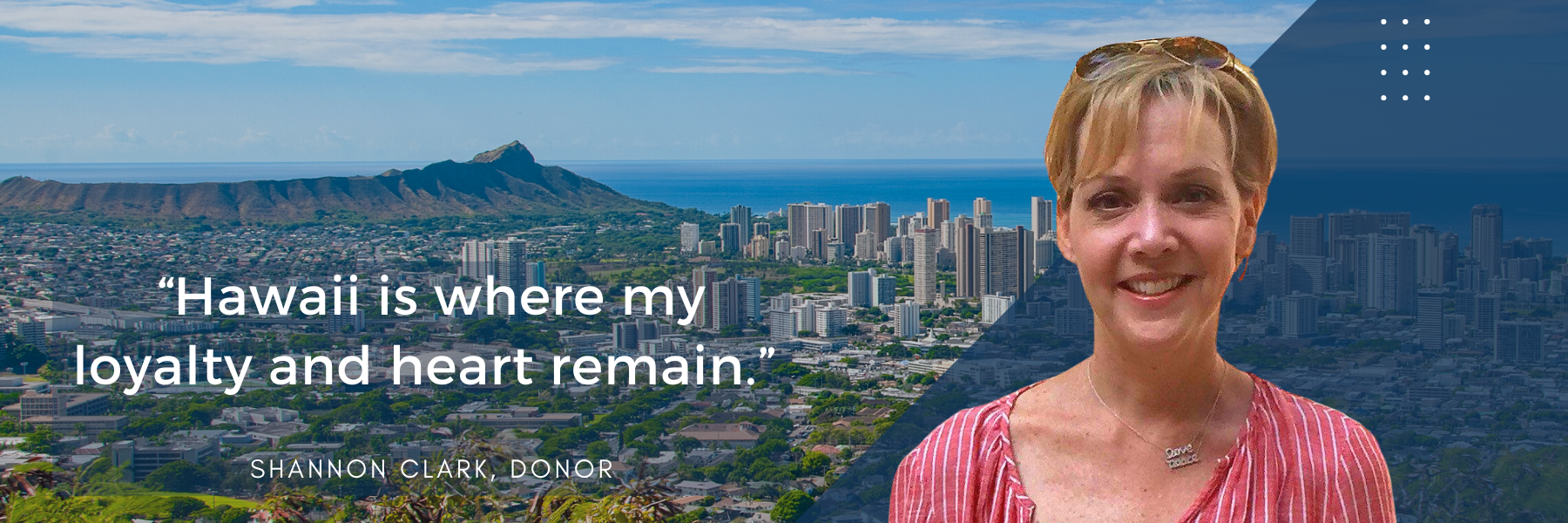|
Long-time Legal Aid donor Susan Ichinose has a legitimate reason to believe that she is investing in something worthwhile – she has seen the organization up close and personal as a member of its Board of Directors.
Susan served on the Board from 2005 to 2017, holding several positions such as President (2013-2014 and 2014-2015), Vice-President (2007-2008, 2008-2009 and 2012-2013) and VP-Secretary (2011-2012). She described fellow members as “effective, socially conscious, and sincere.” And that’s everyone, she says, not only lawyers but community directors who represented the clients. “I believe strongly in Legal Aid,” says Susan, who saw the organization transition through leadership, including the rise and growth of Nalani Fujimori Kaina, Legal Aid’s Executive Director. “Nalani is a dynamo and a game-changer. She is a strong administrator, but more importantly, she is a visionary. She sees things and people not just as they are but as what they can be. Beyond the bounds of Legal Aid, she can be a future leader of Hawaii if she so chooses. Getting to work with her, and to know her, has been a privilege that I may not have experienced but for my service on the Board.” Susan is a former career commercial litigator who now concentrates entirely on neutral work – as an arbitrator, mediator, independent factfinder and workplace investigator, and expert witness. For public service, she was elected by members of the Bar to sit on the Judicial Selection Commission (2008-2014), and served as its Chair (2012-2014). She recently served as a member of the Judiciary's Civil Justice Improvements Task Force, and has been a Board member of the Mediation Center of the Pacific since 2018. How did you find out about Legal Aid? It’s a renowned national organization with a long history of providing free legal services to needy persons in the community. So I've known about Legal Aid for a long time, even before I became a lawyer. Why did you decide to become a Board member? Like many lawyers, I believe strongly in community service. Legal Aid is definitely in the forefront of that. And so when the HSBA called for nominees to serve on the Legal Aid board, I was happy to volunteer and honored to be selected. Describe your experience serving on the Board. It was a tremendously rewarding experience to serve on the Board. I got a chance to contribute to Legal Aid's meaningful community service, and was rewarded also by getting to know other Board members who served with me. Wonderful people like Howard Luke, Joe Boivin, Jodi Yamamoto, Lowell Chun Hoon, Robin Kobayashi, and others became my lifelong friends. I was honored to work with Legal Aid’s wonderful staff members, not to speak of the lay Board members like the late, great community activist Alice Greenwood. I believe I got more out of my serving on the Board than Legal Aid ever did. What makes Legal Aid worthy of your support? Legal Aid is the only non-judicial organization I know of that has its own staff lawyers and permanent professional support staff providing free legal services day in and day out. It's always there, ready to be counted on to assist with legal advice. This includes representation in social service agency proceedings, and, in appropriate cases, court representation. Even if you can't contribute time, every dollar you can spare uplifts someone's hopes, and the community as a whole.
2 Comments
Advocating for justice by making legal services accessible – that’s one of the passions of Charles Greenfield, a longtime supporter, and former Executive Director of Legal Aid Society of Hawai’i.
The spark started when Charles, who also goes by “Chuck,” was a young legal aid lawyer in San Jose, California. As his interest grew, it relocated him to different states and countries. He served in various roles as lawyer, consultant, and executive director - in Northern Virginia, Washington D.C., Guam, Vietnam, Myanmar, Cambodia, Saipan, the Federal States of Micronesia, American Samoa, and the Republic of Palau. Chuck’s time in Hawaii as Legal Aid’s Executive Director from 2006 to 2009 was short but meaningful. He faced three significant challenges when he started at Legal Aid: (1) the high number of residents facing critical civil legal needs throughout the islands; (2) a Legal Services Corporation restriction preventing Legal Aid from representing Hawaii residents who were from the Federated States of Micronesia, Republic of the Marshall Islands, and the Republic of Palau; and (3) Legal Aid’s low salary levels. To meet the tremendous need for civil legal services, Chuck aggressively promoted the telephone intake system, now called “Intake,” expanded Legal Aid’s outreach efforts, and increased and improved partnerships with community groups and government entities. Chuck led the effort, with support from others, to successfully convince the Board of Directors of the Legal Services Corporation to change its regulation to allow for representation by Legal Aid of Micronesians living in Hawaii. In an attempt to raise salaries paid to Legal Aid employees, he received the support of Legal Aid’s Board of Directors to increase salaries. Another achievement was working in collaboration with others to establish the Hawaii Access to Justice Commission. Chuck was a member of the first Hawaii Access to Justice Commission. “To make justice real, we need to ensure that people have access to legal aid. We can help them get relief, or fight discrimination,” says Chuck. “There are so many people whose lives are being trampled on because they don’t know their rights.” Chuck is now retired with 45 years of legal aid work under his belt. But he is far from done in helping the community. He recently finished serving as interim executive director for American Samoa Legal Aid, and also retired as general counsel for Micronesian Legal Services Corporation. He lives on the Big Island. He is calling on lawyers to lend a hand, or a voice, in this advocacy. “As lawyers we have an obligation to see that people are treated fairly under law,” says Chuck. “We have an obligation to see that something is done to help those with unmet legal needs. One way is to contribute money or time to Legal Aid.” According to Chuck, Legal Aid Society of Hawai’i is one of the premier legal aid programs he has seen throughout the country with its “innovative programs, excellent leadership team and wonderful staff.” “The future is bright for the organization, but it needs money and volunteer lawyers,” he stresses. “It is important for the community in Hawaii to contribute to Legal Aid so we can help them staff up for the challenge and help bring positive outcomes for residents. We need to help make justice real for our community.” That’s why he donates to Legal Aid, Chuck says. “So many people are facing critical challenges. There is certainly something we can do about that. Good legal advocacy can bring them much-needed relief.” The spam musubi Shannon Clark receives from a friend who owns a Japanese grocery store is one of the highlights of her day. She would eat all three at once, licking her fingers with a satisfied smile.
Eating spam musubi shouldn’t be that unusual except Shannon lives in Chicago where it’s almost a delicacy. So when Shannon eats, she eats with gusto, satisfying her taste buds and nostalgia. “I love Chicago, but Hawaii is where my loyalty and heart remain,” says Shannon, a Hawaii-born wahine who found her niche in the city as a data privacy lawyer. “My family has been in Hawaii for a long time. Hawaii always feels like home.” Shannon donating to Legal Aid Society was like eating spam musubi – it satisfied her passion to help the less advantaged and brought back memories of the summer of 1994 when she interned as a law clerk while a student at the Indiana University School of Law. “Having worked with Legal Aid, I have confidence in their mission,” says Shannon. “I have a lot of respect for the staff because what they do takes a lot of commitment. The people I worked with were dedicated and good at what they were doing." With the immersive clerkship, Shannon gained valuable experience learning from lawyer mentors and paralegals, going to court, dealing with the practical aspect of client needs, and developing her research skills. Of course, she was also happy to be back in Hawaii with family and friends. “I see a big need especially because of COVID and so many people being out of work,” she says about the current pandemic. “One of the experiences I had when I worked with Legal Aid was the work with housing and Social Security benefits. And because COVID has unfortunately shifted the imbalance a little more, there would be an even more pressing need.” Shannon meets this need by donating to different charities every year, especially choosing to support organizations that provide legal services to the underserved. “Every little bit helps. And collectively, we can make a difference.” Many families need legal services and do not have the financial means to access justice. Join Shannon and the rest of us in helping them recover from the effects of the pandemic. I choose to give to the Legal Aid Society of Hawai’i because while I do not reside in Hawai’i, Hawai’i resides in my heart.
For the past 20 years my family and I have been blessed with the ability to spend more and more time in Hawai’i. The beauty of the land and people have made us feel welcome and at home. We consider Hawai’i the place we most want to be whenever time and pandemics allow. We hope to spend even more time in Hawai’i in the future, so much so that I even became a member of the Hawai’i Bar. I have been in-house Counsel for a Fortune 50 Company for 20 years and I was an attorney at large law firms before that. I love what I do but I also realize that the large companies I help are not the only ones in our communities in need of legal services. Whether we think about it or not, the law touches almost every aspect of our daily lives. Unfortunately, and particularly through difficult times such as we are living now, the people who would benefit the most directly from legal advice are often the ones who have the least access. I am grateful that organizations such as the Legal Aid Society of Hawai’i exist to provide support to a community that I want to see thrive. I want to say thank you to the Staff and Professionals who work with the Legal Aid Society of Hawai’i for the important work you do in providing access to legal services to those in our communities who are underserved and for giving the rest of us a way to be helpful. Mahalo Nui Loa Adriana I. Reyes-Villanueva |
Categories
All
Archives
May 2024
|
|
Home
Get-Help Resources Fair Housing hawai‘i immigrant Justice Center Volunteer JOBS Contact Us Join Our Email List 
Translate this site into
another language |
|
|
THE LEGAL AID SOCIETY OF HAWAII DOES NOT HELP
WITH CRIMINAL OR PERSONAL INJURY MATTERS.
PLEASE CONSULT A PRIVATE ATTORNEY.
computer safety
Websites you visit may be viewed by someone else later.
always clear your browsing history after searching the web.
consider using a public or friend’s computer if you are concerned about someone viewing your browsing history.
Websites you visit may be viewed by someone else later.
always clear your browsing history after searching the web.
consider using a public or friend’s computer if you are concerned about someone viewing your browsing history.
Legal Aid Society of Hawaii is a recipient of federal funding. Legal Aid does not exclude, deny benefits to, or otherwise discriminate against any person on the basis of race, color, national origin, disability, sex, or age in admission to, participation in, or receipt of the services and benefits under any of its programs and activities.
How to file a complaint: If you believe you have been subjected to discrimination by Legal Aid, there are 3 ways to file a complaint with the U.S. Department of Health and Human Services, Office for Civil Rights:
Click here for more information.
GRIEVANCE REGARDING DENIAL OF SERVICS OF QUALITY OF SERVICES
ANY CLIENT OR APPLICANT CAN FILE A GRIEVANCE TO COMPLAIN ABOUT A DENIAL OF SERVICES OR QUALITY OF SERVICES PROVIDED BY THE LEGAL AID SOCIETY OF HAWAII.
CLICK HERE FOR MORE INFORMATION.
How to file a complaint: If you believe you have been subjected to discrimination by Legal Aid, there are 3 ways to file a complaint with the U.S. Department of Health and Human Services, Office for Civil Rights:
Click here for more information.
GRIEVANCE REGARDING DENIAL OF SERVICS OF QUALITY OF SERVICES
ANY CLIENT OR APPLICANT CAN FILE A GRIEVANCE TO COMPLAIN ABOUT A DENIAL OF SERVICES OR QUALITY OF SERVICES PROVIDED BY THE LEGAL AID SOCIETY OF HAWAII.
CLICK HERE FOR MORE INFORMATION.
Legal Aid Society of Hawai‘i ©2020 All Rights Reserved






